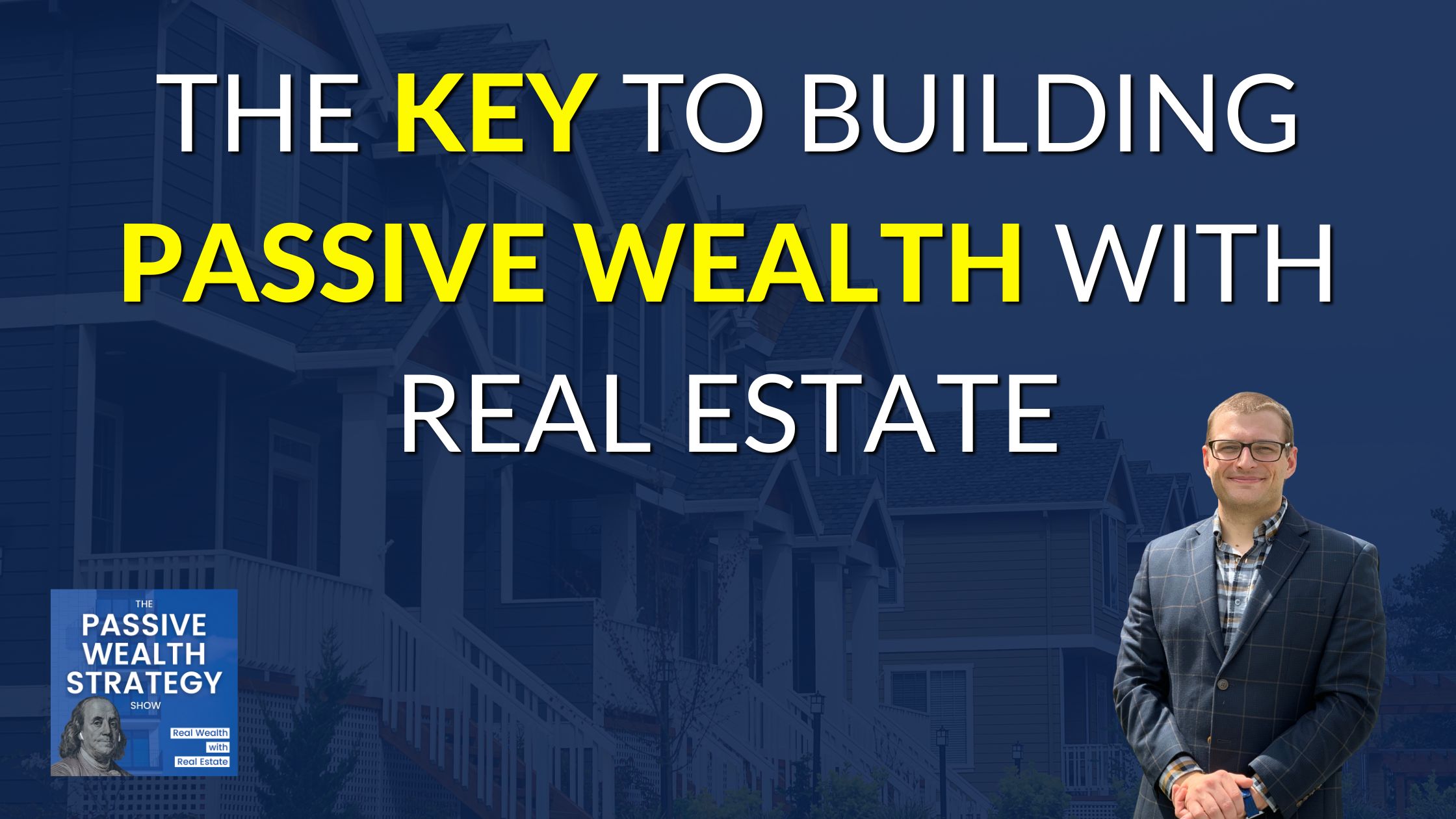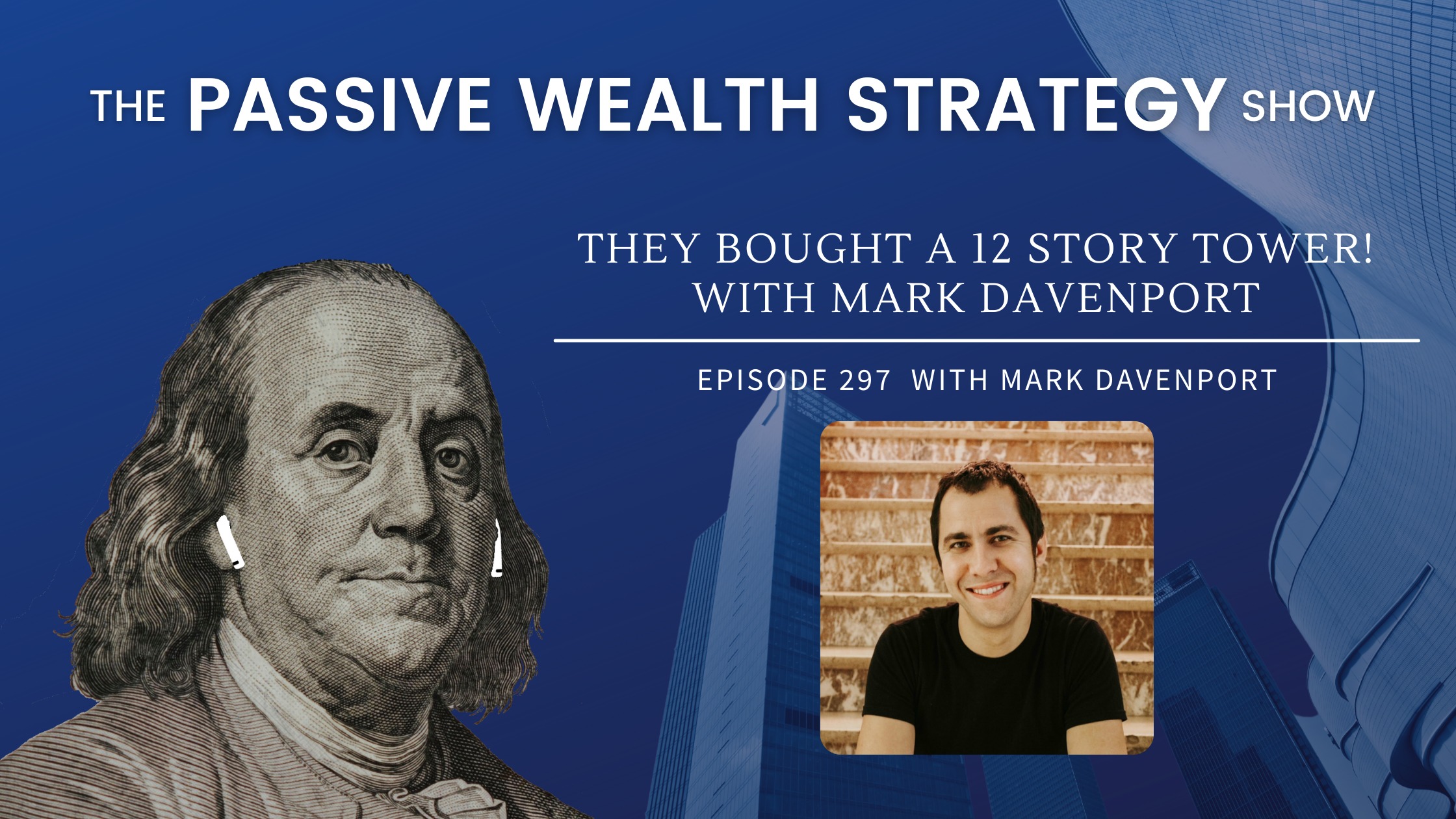
They Bought a 12 Story Tower! with Mark Davenport
Mark. Thank you for joining us today.
Thank you for having me.
It’s been great talking with you here so far. You have such an impressive story and many accomplishments, and so much more ahead of you, and an interesting business strategy for our listeners out there who don’t know about you and your real estate business.
Can you tell us a bit about your background and what you’re doing there in Kansas City?
Yeah, my partner, Phoebe, and I, we all of our properties and we are. Started investing in real estate about five years ago Phoebe was an occupational therapist and I was a musician. We owned our single-family house in New Hampshire and we were, we just had a sense that maybe there was something more for us.
So we thought that passive income wealth building, we’ve got to get out of this situation where we’re working 40 hours to pay the mortgage. And then, to make me have a retirement with a house paid off, then you still have to live in. So it’s not liquid. Anyway, that whole thing, I’m sure if you’re listening to this show, you’ve thought about it, which is why you’re listening to the show anyway.
So we sold the house and bought a duplex or foreclosed, duplex renovated, a place tenants did another one, did a whole bunch of other properties. And then five years later, We find ourselves in Kansas City, Kansas. We own a number of different properties in central Kansas, a 12 story tower, six-story tower.
And I’ve currently also redeveloping a historic property into a boutique hotel. So that’s in a nutshell.
So that is really something. And, a lot of folks who initially get into the business, maybe buy that first duplex stop there. Maybe they’ll buy another duplex here or there, but don’t, they don’t scale to 145 doors in five years.
And that is also noting that you’re not playing. Door count game, where you’re somebody that went in and participated in this indication that was 140 of those 145 doors. There’s a legitimate count of 145, right?
Yeah, no, I’m not into games. That’s not true. I love games, but not those types of games.
That’s very notable that you’ve made that happen. And then I wanted to talk about in your opinion, what sets you apart from those folks that, get started and don’t achieve what you’ve achieved?
Ah, you’re going to make me sound like I love myself. That’s a good question. I don’t really know.
You’d have to ask someone who was looking at our situation. I have some thoughts. Maybe some things might be contributing factors. I think when we got into real estate and started on the duplex, we had a really big. My partner had a bigger vision than me at the time. She was encouraging me to think a lot bigger than just the duplex.
Initially, I was really resistant. I felt too risky. It felt too nerve-wracking and I still have those emotions when we go for a big property. When we go for property, that, that puts us in a whole new category. And managing some fairs and managing some concerns, anxiety, but we wanted it that much.
Ultimately I think maybe I could just boil it down to that. We wanted it that much. We chose to live, but our family was in a house that needed work when BB was expecting our third child we’ve moved states. We moved from Brooklyn to Kansas City to be involved in to have to be exposed to the commercial opportunities that this.
Present. So I think maybe it’s just that we wanted it that much.
I certainly can appreciate that. You mentioned one thing in there managing fears, managing anxieties, and I think fear they say false events appearing real or something along those lines that, that keeps a lot of people out.
That you’re not a real estate investor. You talk to your buddy at work. If you’re a W2 person. And that guy says, oh, my uncle lost his shirt in a great recession. You can’t make money with real estate. And that most people stopped there. You kept moving forward and I’d like to you, you were telling me before we recorded the types of properties that you’re doing.
It’s not like you’re buying the easy stuff. You’re I don’t want to say taking a risk, but you’re I don’t know. Tell us about the properties you’re buying how’s that I don’t want a private too much.
Yeah. It’s all stuff that’s on the MLS and there’s typically been on the MLS for you.
I think maybe one of them was on for four years. No one wanted it. So when we’re looking at stuff, we’re just looking for opportunity. We’re looking for something that’s exciting. These days, we’re looking for a project that has an impact on the city because it’s a really key property in the city or, it’s prominent in the city somehow and it’s.
Revitalization is a communal deal. It’s more than it’s a different type of impact than a duplex or a fourplex. Those things are significant, but it’s definitely a different type of deal. That’s kind of it,
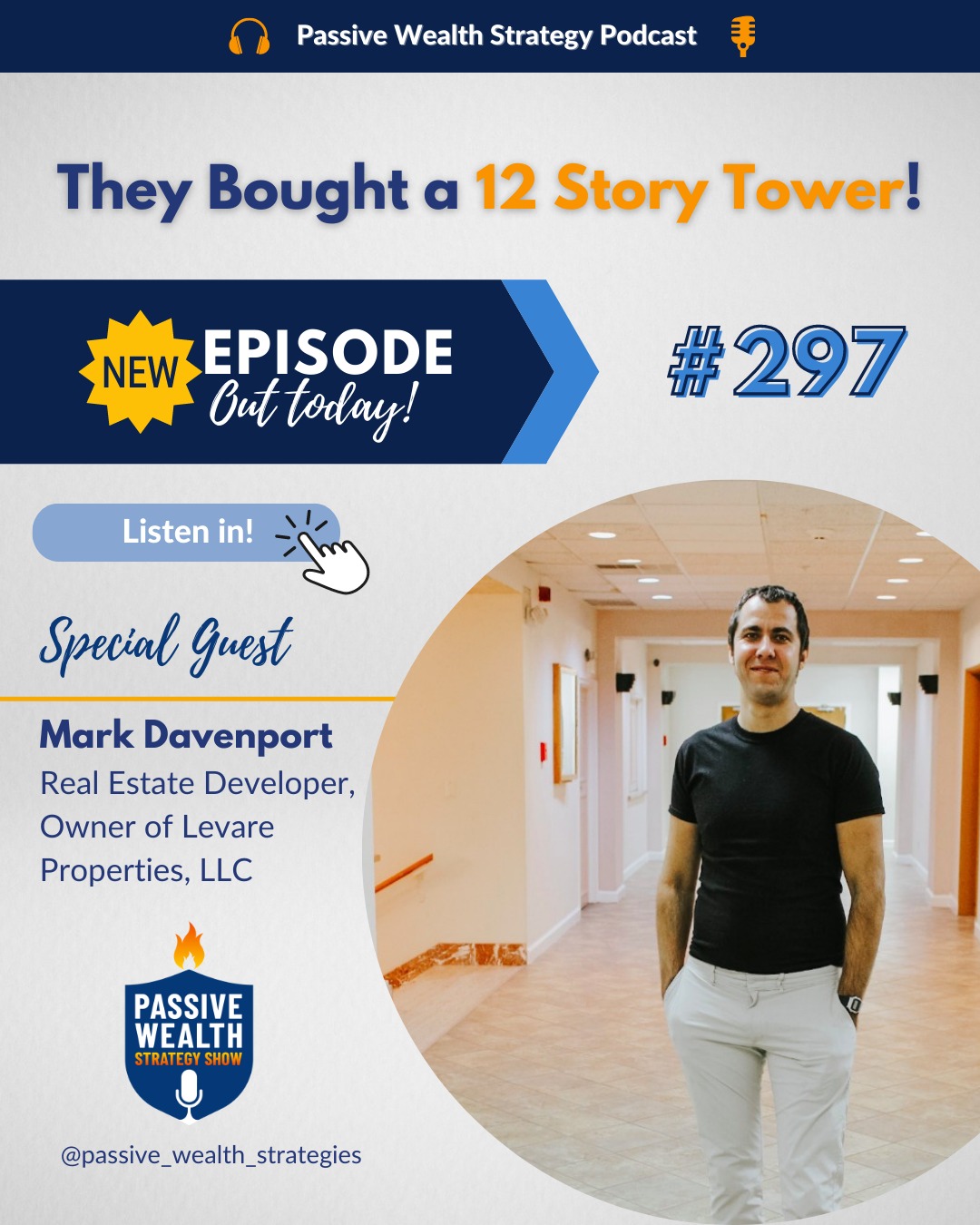
They Bought a 12 Story Tower! with Mark Davenport
How about your mindset? What do you do?
Do you have a practice around that or something that you do that helps you move forward? Because like you said when you were getting started like Phoebe was pregnant with your third child, you move yourself into a property that needed rehab, and then you also, you just kept going and you’ve continued to do those.
Do those deals that you’ve done, how do you work on yours?
I think we welcomed it together. It happens. It happens in the context of our relationship also happens. I see these properties as a personal situation often because as I’m looking at the 12th story tower we bought before we bought the 12 story tower, which is about 72 units, it’s the tallest building in the city that it’s in.
Before we bought that building, the biggest property we owned was a six-unit. Building and you Hampshire. And then we bought this one in central Kansas, and it was when I was looking at the property, I felt all these emotions before we even bought it, I was like, wow, this looks like an incredible opportunity.
The numbers of. So much potential, and it’s a really significant building in, in, in the city. And then as I was thinking about oh, but what if this, what if that nerve-wracking I’ve never done a tar before. I’ve never, even this building has three elevators. How the fuck do you service it?
I’ve never done it before. I don’t know back then I have a little more experience now, but I think it probably is the fact that when I see those things and I feel those emotions, I want to work through them. And I want to process through them and come out the other side. And because of that, I don’t take that situation and then go oh, you know what?
No. My emotional response to this is this might happen or this might happen. Therefore it’s too risky. We’re not, I’m not like that. I’m not like that. Now. I used to be more like that, before, but now I’m like, no, let’s go with. We’ll use this situation to get to a whole nother level, like personally, in terms of faith or confidence in, in, inhumanity or myself, what I can do, what’s that financially it’s great.
It’s a great investment and a towel, a fantastic investment. So I think I, I maybe it’s more that maybe it’s that my inclination is to now see that epic kind of opportunity and be like, yeah, let’s do.
Nice. I really liked that you broke it down that way now, would you say, you mentioned dealing with the emotions and then working through it.
How would you weigh the? Ability to get your mindset in the right place compared to the value and actually knowing, having the experience of working through that deal and just taking it to bite by bite step-by-step would you say my tech comes first knowing how to do it comes first? Or what are your thoughts about the relative importance of either one of those in the business?
Yeah. My experience tells me that the mindset is quite significant, the more important factor only because not only because but maybe for one reason might be that in order to keep on biting off those little chunks to close a deal like that. You just got to have control of your brain, or maybe not control of your brain, because everything’s going crazy up there, but at least control of your actions.
So if I’m at like we finance the property we did it in a town. That’s three hours away from where we live. We knew no one in the town prior to buying this building. We rolled in with our kids. I think we did bring our kids and our realtor into town, checked out this property, and then went to work, making relationships in the community, and all the while I’m building relationships with these bankers or, talking with this person, whatever to make the deal happen.
My brain is firing off at various different points. Oh, you just gotta be careful. Maybe you’re not gonna be able to close this deal. But you can have all those thoughts, but you can still say something really good. You can still say something that presents confidence or you can still choose, even though you’re not sure you can get financing, you can still choose to call another five banks.
So I think there’s a, for me, there’s a difference between what my internal state is and what the decisions I make are. And I, my internal state might be just all kinds of crazy, but if I can make good decisions then we can move forward and I can walk on my internal state in time, but I think the key thing, or there’s one key thing might be making good decisions in the midst of the crazy,
That is interesting.
Now I wonder you mentioned specifically about getting financing, right? There’s a potential bias of somebody to say this guy bought a tower. He must have had millions in the bank. He must’ve come from some significant amount of money or something like that. Listen to his accent, man.
This dude was born in a castle. He moved over here. He sold some of his gold bars that his family’s had for years and all that stuff. So yeah. Tell us about that and your background and. Ha, you know how that has informed where you got to, for the listener?
Yeah. I grew up in section eight, housing in the UK.
It’s not called section eight in the UK, but that’s what, that, that’s the type of housing. It’s government housing. So I didn’t have access to the money in terms of our real estate situation is not us moving one-pot around all the time. And then have 3% growth. That’s not what we do. I think.
Yeah. I remember one of them, one of the things like when we tried to finance this property this tower was, I met with lots of different banks and one of the banks was like, you don’t have $2 million or millions or maybe a million or one and a half million. I don’t remember the exact thing. It was a lot.
You don’t have that in the bank. So we can’t work with you on this deal. And I’m like, if I had that money in the bank, I wouldn’t be buying this property. No, I don’t need either Phoebe or icon coming from significant resources in that way. We weren’t homeless. But certainly, I, where to stay adventure, isn’t the kind of moving money around the situation.
It’s about making value where there’s, where there is none or where there’s little, or where no one thinks there is. Proving it and saying maybe be the being the first person in that town to say, yes, there’s value in this building. And I’m going to work on making that come through. And then eventually, of course, everyone sees it.
It’s difficult to be the first responder, but then in time, the momentum grows, and then everyone’s oh yeah. Quite a property.
Nobody knew we wanted that everybody in the world wanted an iPhone until we had the iPhone. And we were like, oh man, we all want one of these or Android as a case, but I’m an Android user.
Why I say ask them. But they were iPhone was first. Now another thing I think. Generally, we probably don’t talk about it enough and real estate is getting over rejection. It’s very common and the dating scene, whatever, they talk about getting over rejection when you’re trying to date new people.
But you mentioned an interesting case of at least one instance of rejection. And it sounds like you went through quite a few more and got that tower finance. And that’s another aspect of psychology that I’d like to get in. Is how did you get past that? I don’t have, if I had the 2 million, I wouldn’t be buying this tower.
How do you just keep moving forward through facing that rejection?
Yeah, yeah. It’s turbulent. There’s no doubt about it. It’s less typing it now because I’ve done enough that I have a more clear now I’ve done one 12 story tag and go to someone else and say, Hey, look what we did here.
It doesn’t have me with a 50 story tower, so that will be a whole new thing. But I think, yeah, you just, I guess you just got to keep on going for you didn’t you’ve gotta be convicted. You got to know that what you know, that you can do it or have enough that’s in you that says you can always make the next step that you’ll just do it.
You’ll go for it. And that is our story. I like what you say about that, how people will look at our situation, if anyone’s looking at our situation and they will make assumptions about the resource we had, or, this was easy, it’s a kind of a red velvet carpet situation. You just wander into these situations.
Not that way at all, in almost all of our properties every time or often we’re always jumping in. And our acquisition. So going from six stories to 12 stories or going from all multi-family to a hotel whatever it is, we’re often because we love the growth and the scale and the opportunity and the adventure.
We’re always, we’re often looking to make that step. But then actually no one wants to finance us apart from one, almost with the key properties we’ve done, I’ve looked at all the banks in the area and they will only one that will work with. So that’s that just tells you it’s not oh yeah, we come to town and everyone’s oh, their hair.
Oh yeah. We’ll finance. We’ll work with you. It’s not like that at all. It’s like calling everyone and sitting down and being like some will say you don’t have the equity or you don’t believe you can do this project, or if someone says.
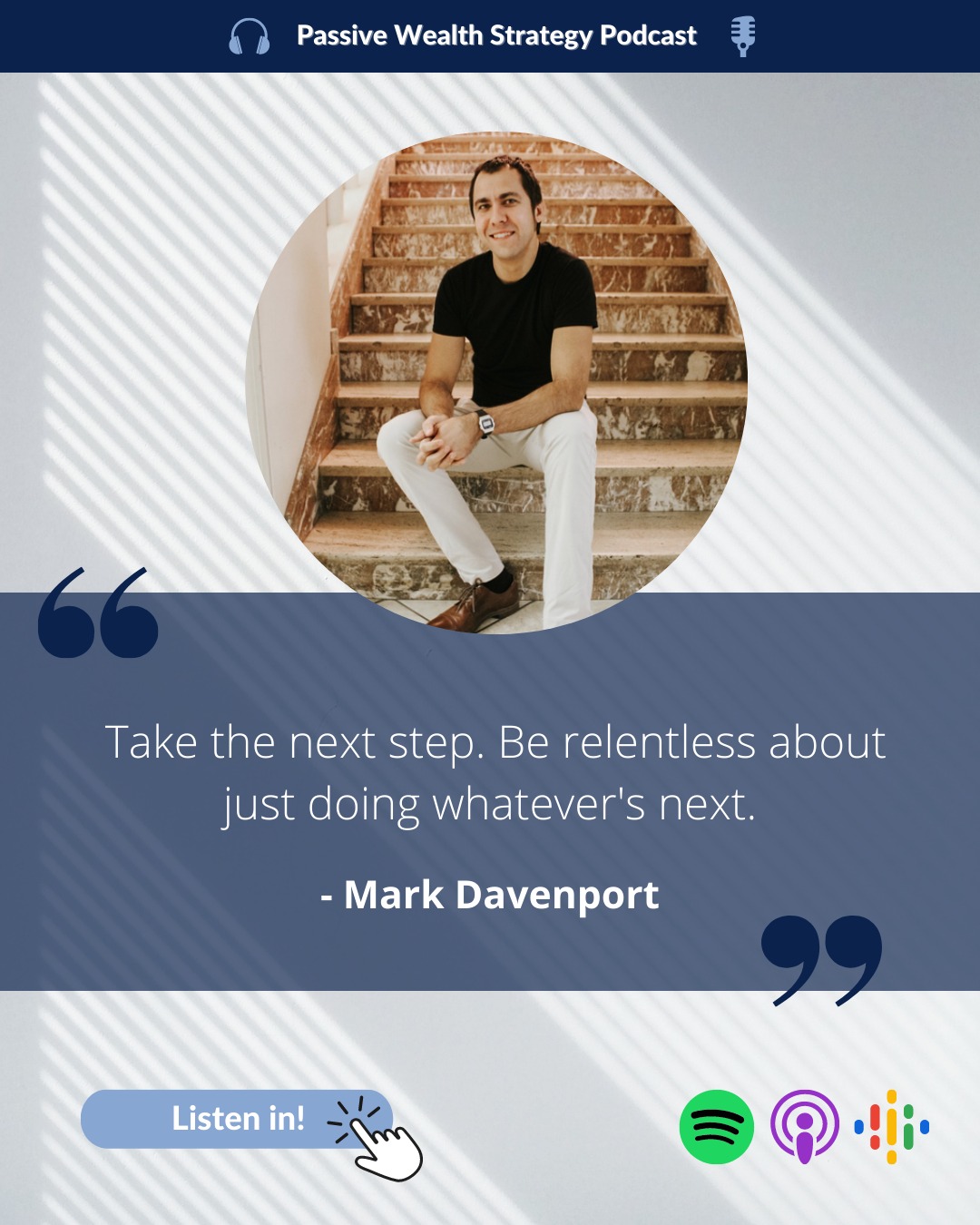
Take the next step. Be relentless about just doing whatever's next.
Mark Davenport Tweet
So another thing that I think is very notable, for the listeners you and I had a conversation for about half an hour before we started recording. And you mentioned another thing I want to make sure to bring up, which is. Recognizing value. If you remember that, that part of our conversation before and how you and Phoebe see value differently from others.
And I want to also bring up the comment that the entire time I’ve been a real estate investor, which is roughly the same amount of time as you five, maybe six years in a row. People have been saying. There are no deals for one and for two, the real estate, market is about to crash. Now, I don’t know about number two.
I can’t predict the future. I feel pretty good about the properties we have. I don’t know what’s going to happen next year for sure though, but that idea is that there are no deals out there. We have to really dig for yield, dig for value. And you were talking about, you were telling me about how you recognize deals and your thoughts about that.
So tell us about that and how you again push through or ignore that mentality that there are no deals. Yeah.
Yeah. I’ve just never found it to be, it’s just never been in my experience. That’s true. I think maybe there’s certainly a certain way of looking at the market or certain kind of lenses that you might have on, or so if you’re only looking at a certain market or you’re only looking for a certain opportunity, you might look at that and say, there are no deals.
I think ultimately that kind of, that, that finger that’s pointing the market and says the market is insufficient, really comes back and ends up pointing at the person. Who’s saying that about the market and saying actually the market’s totally fine. Maybe not totally fine, but really the fingers mostly pointing back at you and saying where are your eyes?
Where are your glasses? What are you seeing? And I’m increasing, as I get older kind of convinced of the power of perception to alter reality and shape reality. And I, so when I hear a common comment like that, like what you said, where people say, there’s no opportunity and people will say that to me too.
I’m like where have you looked? What are you looking for? Have you tried investing in this state? Or, how much do you want this? You don’t have to want it that much, but if you really want it, you will find it, you probably will find it. So if you’re not finding it, I think it’s just an interesting kind of observation to say maybe.
If you take stock of it, maybe you don’t really want it that much, which is fine, but you might, that might be helpful information.
I think the level of commitment is very important, right? Because it’s, maybe it is true that it’s hard to look and just stick your finger on the MLS and find a cash flow in property that’s can be a reasonably factual statement, but to draw the conclusion it’s not possible at all.
It can be a little premature and if you’re really committed, you’re going to keep looking.
Right? Yeah, I think yeah.
So you’ve tackled some interesting deals. Aside from the fact that it’s a 12 story tower, it’s not at least from my understanding you’re buying these properties that are, the prime deals in the area.
You mentioned that property was on the market for four years, which kind of says something about how to say desirable. It was too. Other investors. How do you think about that? What types of deals are you going after? What kind of, what class would you call them? How heavy lift are they let’s get into that?
Yeah. We invent new letters at the end of the alphabet for the properties we do. D class maybe typically like C classes is just pure heaven, yeah. Typically we’re looking for smaller cities or towns in the Midwest. That has a blighted downtown where there’s not a lot of economic activity.
That’s typically what I’m looking for these days is I’m scaring the US for the next kind of fun properties to do. I’m looking for that. I’m looking for the right price point. I’m looking for a small-ish town so we can get large properties and. Where people have doubts about the economy.
That for me is perfect.
Revitalization is a communal deal. It's more than it's a different type of impact than duplex or a fourplex. Those things are significant, but it's definitely a different type of deal.
Mark Davenport Tweet
Are these I’m just making this connection now, or I’m curious about this now. Are they, are your tenants, like section eight, since you were, you grew up in the equivalent in the UK, you might be more comfortable with that than other investors, or, if it’s blinded downtown, how are you assessing the demand?
Yeah. Rarely section eight, we will take section eight tenants. We don’t manage our properties directly. We have property management companies work with them, but we will we’ll take a section eight tenant, although I’m not sure we have any section eight tenants. I think it’s mostly a reflection on if you have a town of a hundred thousand people that’s remained stagnant for a while with a historic downtown.
That isn’t doing so well. It hasn’t been revitalized. Those things will take their headlines, but even within that community, there’s an offer. At least my experience has been, somewhat limited so far, but from what I’ve seen, there’s still a huge number of people in that town who are visioned for the town.
And there’s still the basic status of humanity, which is there’s employment. There’s there is, there are hard-working people. So we’ll typically stake our bet on that. B maybe some of the early people to invest in that market, even then we won’t be the only ones we’ll find when we find, as we start investing that we start discovering other people who’ve been investing in properties downtown as well.
And then the thing starts to get more momentum. I guess what I’m really saying is I like to be at the beginning or very close to the beginning of a movement or a kind of. Yeah, a movement in a city to make that place better. I’ve found, for example, there’s a historic part of Kansas City.
It’s called the west bottoms, historic west bottoms, and a ton of dilapidated historic properties, really beautiful. Stunning is also scary for some of them in terms of their condition. And you’re talking about big properties, maybe 50, 75, a hundred units would go in them, but they’ve dilapidated their shells.
One of them comes on the market for 2 million and that’s. And it still needs to be developed well in a town that where the world go for, where the rents aren’t that much less than Kansas city, that property comes on the market for 200,000. So it’s the difference between the rents in Kansas City on 20 times what they are in in a small town in, in, in Oklahoma, but the property price is that much cheaper in Oklahoma.
So it’s that type of metric where we see that it’s disproportionate. There’s a disproportionate amount of gain to be had by being someone who goes early by being someone who sees an opportunity early, you get more opportunity because of that. You get paid for your vision is, I guess is what it comes down to.
Interesting. I like that way of thinking about it in many of those areas that start getting revitalized are getting very expensive, get a lot of attention from big money developers and they drive.
And that’s cool. That’s just the way it goes. I have no critique of that, but I’m just not interested in that.
Fair enough. Right now, we’re going to take a quick break for our sponsor. All right, mark. I’ve got three questions. I asked every guest on the show. Are you ready? Yeah. Great. First one. What is the best investment you ever made other than in your education?
Does real estate qualify?
Yeah, absolutely. Do you have a particular deal that, that rings.
Yeah, it’s the first one we did. We went from a single family to a duplex, a complete kind of gut renovation type situation. It got our kind of expanded our vision for what we could do and what was possible. And our first taste of living mortgage free.
Nice. I liked that we had the best investment. Now we go to the other side of that coin, the worst investment.
What is the worst investment you have?
I have several of those.
How much time do you have? We’ll take all of them whenever you want.
Single-family homes. We’ve done a handful of single family flips. And we’ve, they’ve just not nearly done as well as we could have done if we’d have focused our energy on some other things.
So those are lessons learned.
Nice. Hopefully while you’ve obviously turned, those lessons learned into more money anyway, so it’s all working out. My favorite question here at the end of the show is what is the most important lesson you’ve learned in business and investing?
It is, I think to just take the next step, whatever, wherever I’m at in my situation, which is unique to me and everyone has their own situation.
And wherever you want to go, wherever I want to go, all that’s in front of me in any moment is just the next step is to make a phone call or to go online and look at something or to make a point of adjusting a thought process that, I now know is not helpful for me.
So just to take the next step to be relentless about just doing whatever’s next.
The situation, you have that next step in mind. And for some reason you’re just putting it off. You’re not taking it even though, what it would be.
Yeah. If you still think it’s the white step that you just, I don’t know, it sounds reductionist to say this maybe, but you just got to do it.
You’ve got to find resources within yourself or I think sometimes those situations could be indicators that it’s actually not a good step for you to take, so it’s maybe the pausing is actually. This, you have other information you need to look at, or, there’s a check in your gut where you’re like, ah, I don’t need to do this, but if you know that this is what you got to do, and you’re just holding back, you just got to do it.
I know it sounds reductionist. And maybe I have insane that I’m not helping people to do it, which is probably true. But I’m still going to say it. You just got to do it.
Just got to understand yourself, know whether it’s a check in your gut or whether you’re just being lazy and putting the work off and not getting things.
Yeah. Mark, thank you for joining us. Today is great learning from you. A great to get to know you and it’s impressive. Everything that you’ve done, and I’m sure it sounds like there are many great things to come in the future. If folks want to reach out, if they want to get in touch with you, they want to find you on the internet network, where they get to know you, whatever, where can they track?
They can find us at our website, Lovette properties.com, Lev a R E Lovette properties to shoot an email to hello at LaVar properties. And you will find.
Great. Thank you once again, so much for joining us today to everybody out there. Thank you for tuning in. If you’re enjoying the show, please leave us a rating and review on apple podcasts.
I appreciate that so much that helps other people learn about the show because it helps us rank higher in the apple podcast ecosystem. And I’m always honest with you guys. That gives me the warm and fuzzies. Cause I get to see that you’re engaging with the content and you’re escaping and the wall street casino, along with us.
If you know anyone who could use a little bit more passive wealth in their lives, please share the show with them and bring them into the tribe. Thank you for tuning in once again, that’d be have a great rest of your day and we’ll talk to you on the next one. Bye bye.

Levare Properties, LLC
About our Guest
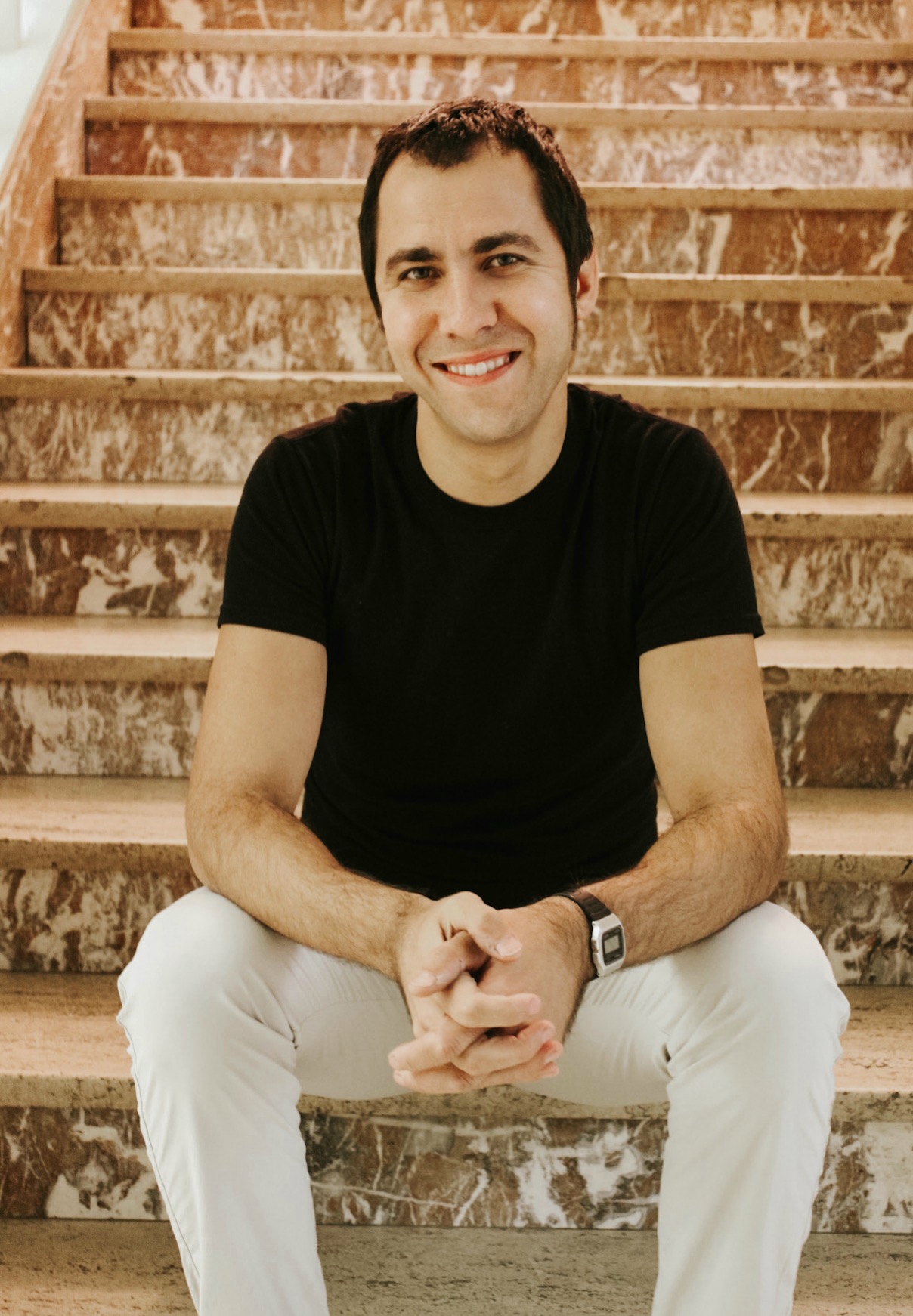
Mark Davenport
Mark is a real estate investor with a passion for renovating historic buildings and improving property management. He came into real estate mostly by chance. In his early twenties, he worked as a musician before he transitioned into construction and property management. He learned construction by renovating his single-family house and the various investment properties Phoebe and he have renovated/managed along the way.
Episode Show Notes
Mark is a real estate investor with a passion for renovating historic buildings and improving property management. He came into real estate mostly by chance. In his early twenties, he worked as a musician before he transitioned into construction and property management. He learned construction by renovating his single-family house and the various investment properties Phoebe and he have renovated/managed along the way.
[00:01 – 04:38] Opening Segment
- Get to know Mark Davenport
- How Mark and his wife got into real estate
- Kansas City Real Estate
[04:39 – 09:52] Working Together
- What makes Mark unique is…
- Looking for something with potential and excitement!
- Mark’s Real Estate Mindset
- “We work on it together.”
[09:53 – 23:31] They Bought a 12 Story Tower!
- How to Get Your Mindset in the Right Place
- Internal State versus Decision-Making
- Real Estate in the United Kingdom
- How to Get Over Rejection
- Mark’s Rejection Stories
- Recognizing Value Differently
- The Types of Deals Mark Invests In
- At the Beginning of The Historic West Bottoms
[23:22 – 30:22] Closing Segment
- Quick break for our sponsors
- Groundfloor offers short-term, high-yield real estate debt investments to the general public. Check www.passivewealthstrategy.com/groundfloor/ to get started.
- What is the best investment you’ve ever made other than your education?
- Single family to a duplex
- Mark’s worst investment
- Single family homes
- What is the most important lesson that you’ve learned in business and investing?
- “Just take the next step.”
- Connect with my guest. See the links below.
Tweetable Quotes:
“You can always make the next step.” – Mark Davenport
“I like to be at the beginning.” – Mark Davenport
“You just gotta do it.” – Mark Davenport
————
Connect with Mark Davenport through [email protected], Instagram and LinkedIn. Visit their website https://www.levareproperties.com/.
Invest passively in multiple commercial real estate assets such as apartments, self storage, medical facilities, hotels and more through https://www.passivewealthstrategy.com/crowdstreet/
Participate directly in real estate investment loans on a fractional basis. Go to www.passivewealthstrategy.com/groundfloor/ and get ready to invest on your own terms.
LEAVE A REVIEW + help someone who wants to explode their business growth by sharing this episode or click here to listen to our previous episodes







